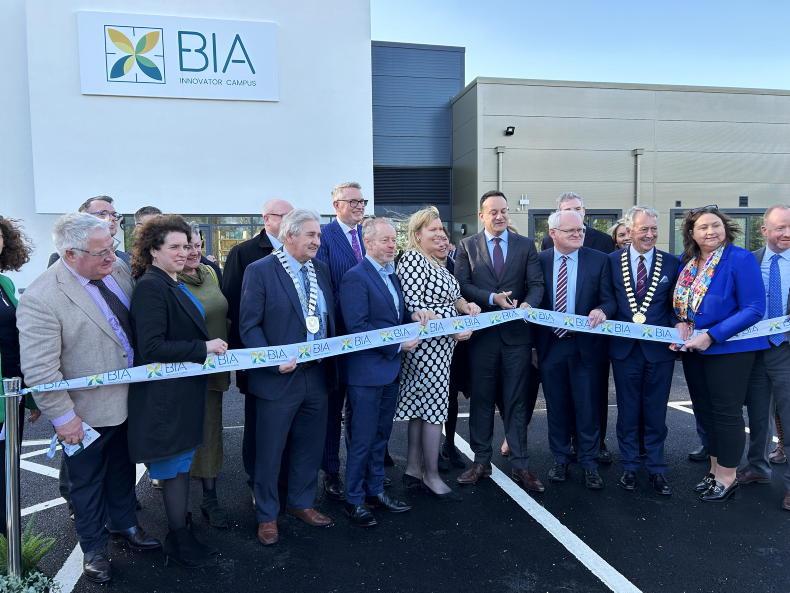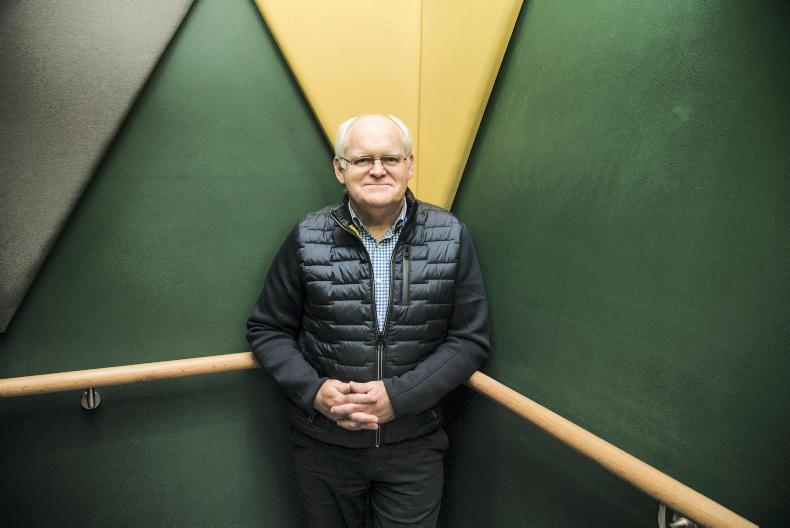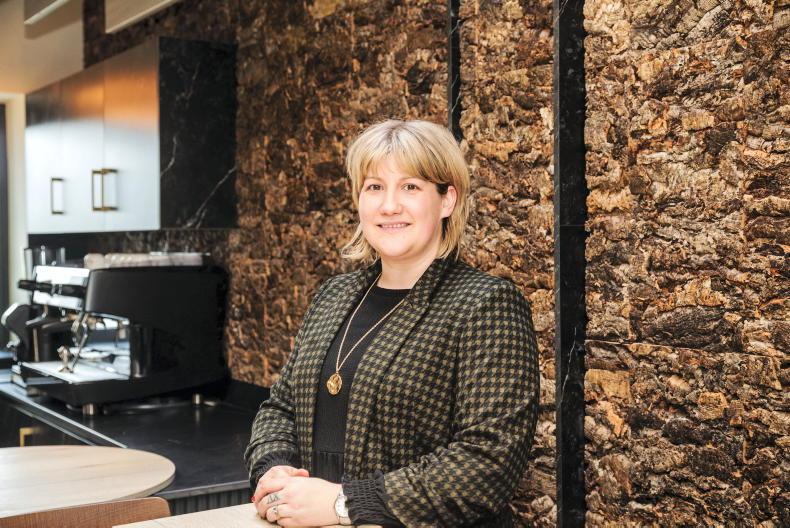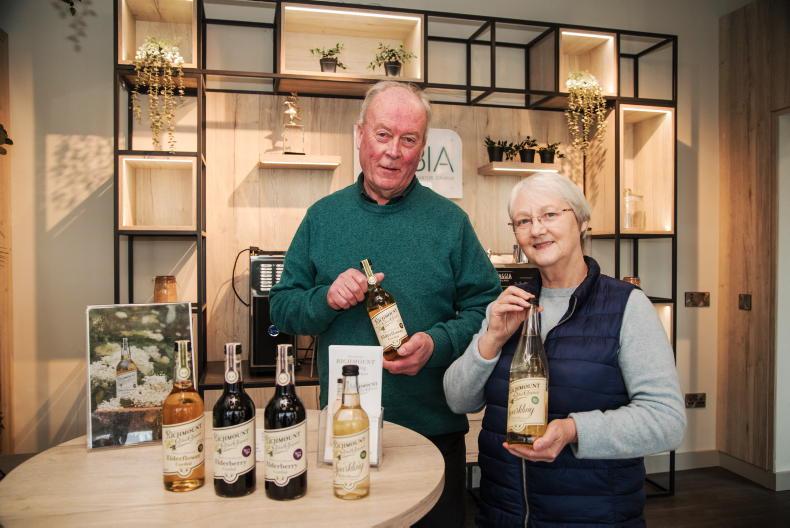Before I became a full-time journalist I used to sell donuts at the Thurles Farmers Market in my home county of Tipperary.
I would get up at 4am, start the coffee machine at my friend’s café, make the dough and fry off tiny batches of donuts (in a tiny deep-fat fryer) before filling and decorating each one by hand. It was a labour of love.
The thing is, for all the work I was doing, I wasn’t making any profit. Once I added in labour, kitchen rental, overheads and equipment, I was in the red each week. To be profitable, I would have needed to invest in space and equipment for scalability – and I did not have the financing to do that.
My customers were disappointed when I stopped selling donuts, but the supports weren’t there for a micro-business like mine.
Perhaps if the new BIA Innovator Campus in Athenry, Co Galway had been in existence then, I wouldn’t be writing this article and might instead be cooking in the kitchen of my own little café.

Former Taoiseach Leo Varadkar officially opened the BIA Innovator campus.
BIA Innovator Campus
Officially launched in January by the then Taoiseach Leo Varadkar, the BIA Innovator Campus is a one-stop-shop for food producers. Operated as a not-for-profit organisation, the campus is partnered with several stakeholders: Galway County Council, Teagasc (the campus itself is located on Teagasc Mellows Campus), the Local Enterprise Office, the GRETB (Galway Roscommon Education and Training Board), the Western Development Commission, registered charity SCCUL Enterprises and Athenry Community Council.
The campus is home to several fully-licensed development kitchens, an auditorium fitted with a demo kitchen, a podcast room, hotdesk office space, a presentation room and – for larger food businesses looking to scale – adaptable production kitchen space available for 4.5-year lease.

Peter Feeney is chairperson of the BIA Innovator Campus board.
Peter Feeney is chairperson of the BIA Innovator Campus board. A former elected member of Galway County Council, he saw the difficulties for a small food business to expand.
While on the county council, Peter chaired a policy committee for economic development. In 2018, Galway was awarded European Region of Gastronomy, and he began to look more closely into local food production as part of a legacy project the committee were working on.
“We had a lot of very small micro-producers, and then there were some reasonably sized producers, but the whole middle space was vacant,” he says. “We thought there must be a problem with scaling up, so we looked into it and we found there was.
“Food is not something you go into to make a huge amount of money,” he continues. “For the amount of investment needed [to scale]; no individual could afford that on the basis of a hunch.
“We wanted to remove the risk of starting a food business, so we decided to set up an innovation centre for food.”
New Territory
With so many stakeholders involved, Peter says they were working in new territory during the development of the campus. However, the good will of everyone involved ensured the project was a success.
“We’ve now had enquiries from food producers from 21 counties, including Northern Ireland,” he says. “The whole idea is, if you have a good idea and a bag of ingredients, we can take you from that stage all the way to exporting your product – without you putting your life on the line economically.”
Aside from the campus being located on Teagasc’s Mellows Campus, as stakeholders Teagasc have also provided the campus with two food technologists: Dr Anita Furey and Colm Foley.
“Anybody with a food idea can phone up, have a chat and see what’s possible,” Peter says. “At any stage along the way, you can come back with questions or issues. Anita and Colm are here on-site every day. They are really approachable and they know their stuff.”
Working with the GRETB, food education is also a large element of the BIA Innovator Campus offering. They are currently hosting a bakery course and plan to launch a commis chef training programme in the coming weeks.
“This space is about creating capacity, creating a community and links. We hope that for people who meet here, there will be cross fertilisation of ideas and maybe some joint ventures in the future,” Peter says.

Devon Butterfield, operations manager.
The right environment
Devon Butterfield is BIA’s operations manager, meaning she is on-site working with students, chefs and food producers everyday.
She tells Irish Country Living that being an entrepreneur can be lonely but in the current economic climate, it can be inspiring to come to a communal space and openly discuss your experiences with people in similar situations.
“There is something powerful about having people in your life,” she says. “It’s can be hard to know sometimes if you’re making the right decisions. We aren’t always great at asking for help, but if you’re already in the space, it becomes a lot less daunting.”
Most importantly, Devon feels the BIA Campus encourages innovation by eliminating a number of the challenges food producers face.
“Ask any food producer – they are consumed by red tape,” she says. “We take a lot of that pressure off; not only having a fully certified facility, but also having our food technologists here to help with HACCP [Hazard Analysis and Critical Control Points] planning, production flow, documentation or by linking in with the EHOs [environmental health officers].
“Food businesses have a lot of boxes that need to be ticked before you can get that product out the door. We are here to take that pressure off; to allow people to think outside the box and lean into innovation and creativity.”
‘We had actually been growing sweetcorn and we started supplying some restaurants [including Chapter One in Dublin]’
When retired dairy farmer David started planting elder trees on what used to be his cow paddocks, a few eyebrows were raised. However, he and his wife, Martina, knew exactly what they were doing.
Martina couldn’t find any cordials in her local supermarkets made with simple ingredients. This led her to start making her own elderflower cordial from scratch.

Martina and David Burns.
“We had actually been growing sweetcorn and we started supplying some restaurants [including Chapter One in Dublin],” David explains. “We then received a Euro-Toques award – some of the chefs we supplied had nominated us.
“After the event, as a thank you, we gave one of the chefs a bottle of our homemade elderflower cordial and he really liked it. We thought there might be an opening here – there was no one else doing elderflower cordial at scale, at that time. So we planted trees and started quietly working at that.”
While Martina worked on scaling the recipe, David took to the road and was pleased at how many stockists were willing to purchase their product.
In 2015, they built a production facility on their farm and were able to increase production – they even began exporting their cordial to Japan.
Now, they are at production capacity but they want to expand their product offering. This is where BIA Innovation Campus is helping them.
“We want to grow another product,” Martina says. “The facilities they have here and the research they can do for us is absolutely brilliant. Like our elderflower, we want our new product to be entirely grown and produced in Ireland.”
They hope to launch their new product in the coming months, so watch this space.
• richmountcordials.ie
Read more
Modern-day challenges of Irish black pudding
Irish food professionals attend annual Parabere Forum in their droves
Before I became a full-time journalist I used to sell donuts at the Thurles Farmers Market in my home county of Tipperary.
I would get up at 4am, start the coffee machine at my friend’s café, make the dough and fry off tiny batches of donuts (in a tiny deep-fat fryer) before filling and decorating each one by hand. It was a labour of love.
The thing is, for all the work I was doing, I wasn’t making any profit. Once I added in labour, kitchen rental, overheads and equipment, I was in the red each week. To be profitable, I would have needed to invest in space and equipment for scalability – and I did not have the financing to do that.
My customers were disappointed when I stopped selling donuts, but the supports weren’t there for a micro-business like mine.
Perhaps if the new BIA Innovator Campus in Athenry, Co Galway had been in existence then, I wouldn’t be writing this article and might instead be cooking in the kitchen of my own little café.

Former Taoiseach Leo Varadkar officially opened the BIA Innovator campus.
BIA Innovator Campus
Officially launched in January by the then Taoiseach Leo Varadkar, the BIA Innovator Campus is a one-stop-shop for food producers. Operated as a not-for-profit organisation, the campus is partnered with several stakeholders: Galway County Council, Teagasc (the campus itself is located on Teagasc Mellows Campus), the Local Enterprise Office, the GRETB (Galway Roscommon Education and Training Board), the Western Development Commission, registered charity SCCUL Enterprises and Athenry Community Council.
The campus is home to several fully-licensed development kitchens, an auditorium fitted with a demo kitchen, a podcast room, hotdesk office space, a presentation room and – for larger food businesses looking to scale – adaptable production kitchen space available for 4.5-year lease.

Peter Feeney is chairperson of the BIA Innovator Campus board.
Peter Feeney is chairperson of the BIA Innovator Campus board. A former elected member of Galway County Council, he saw the difficulties for a small food business to expand.
While on the county council, Peter chaired a policy committee for economic development. In 2018, Galway was awarded European Region of Gastronomy, and he began to look more closely into local food production as part of a legacy project the committee were working on.
“We had a lot of very small micro-producers, and then there were some reasonably sized producers, but the whole middle space was vacant,” he says. “We thought there must be a problem with scaling up, so we looked into it and we found there was.
“Food is not something you go into to make a huge amount of money,” he continues. “For the amount of investment needed [to scale]; no individual could afford that on the basis of a hunch.
“We wanted to remove the risk of starting a food business, so we decided to set up an innovation centre for food.”
New Territory
With so many stakeholders involved, Peter says they were working in new territory during the development of the campus. However, the good will of everyone involved ensured the project was a success.
“We’ve now had enquiries from food producers from 21 counties, including Northern Ireland,” he says. “The whole idea is, if you have a good idea and a bag of ingredients, we can take you from that stage all the way to exporting your product – without you putting your life on the line economically.”
Aside from the campus being located on Teagasc’s Mellows Campus, as stakeholders Teagasc have also provided the campus with two food technologists: Dr Anita Furey and Colm Foley.
“Anybody with a food idea can phone up, have a chat and see what’s possible,” Peter says. “At any stage along the way, you can come back with questions or issues. Anita and Colm are here on-site every day. They are really approachable and they know their stuff.”
Working with the GRETB, food education is also a large element of the BIA Innovator Campus offering. They are currently hosting a bakery course and plan to launch a commis chef training programme in the coming weeks.
“This space is about creating capacity, creating a community and links. We hope that for people who meet here, there will be cross fertilisation of ideas and maybe some joint ventures in the future,” Peter says.

Devon Butterfield, operations manager.
The right environment
Devon Butterfield is BIA’s operations manager, meaning she is on-site working with students, chefs and food producers everyday.
She tells Irish Country Living that being an entrepreneur can be lonely but in the current economic climate, it can be inspiring to come to a communal space and openly discuss your experiences with people in similar situations.
“There is something powerful about having people in your life,” she says. “It’s can be hard to know sometimes if you’re making the right decisions. We aren’t always great at asking for help, but if you’re already in the space, it becomes a lot less daunting.”
Most importantly, Devon feels the BIA Campus encourages innovation by eliminating a number of the challenges food producers face.
“Ask any food producer – they are consumed by red tape,” she says. “We take a lot of that pressure off; not only having a fully certified facility, but also having our food technologists here to help with HACCP [Hazard Analysis and Critical Control Points] planning, production flow, documentation or by linking in with the EHOs [environmental health officers].
“Food businesses have a lot of boxes that need to be ticked before you can get that product out the door. We are here to take that pressure off; to allow people to think outside the box and lean into innovation and creativity.”
‘We had actually been growing sweetcorn and we started supplying some restaurants [including Chapter One in Dublin]’
When retired dairy farmer David started planting elder trees on what used to be his cow paddocks, a few eyebrows were raised. However, he and his wife, Martina, knew exactly what they were doing.
Martina couldn’t find any cordials in her local supermarkets made with simple ingredients. This led her to start making her own elderflower cordial from scratch.

Martina and David Burns.
“We had actually been growing sweetcorn and we started supplying some restaurants [including Chapter One in Dublin],” David explains. “We then received a Euro-Toques award – some of the chefs we supplied had nominated us.
“After the event, as a thank you, we gave one of the chefs a bottle of our homemade elderflower cordial and he really liked it. We thought there might be an opening here – there was no one else doing elderflower cordial at scale, at that time. So we planted trees and started quietly working at that.”
While Martina worked on scaling the recipe, David took to the road and was pleased at how many stockists were willing to purchase their product.
In 2015, they built a production facility on their farm and were able to increase production – they even began exporting their cordial to Japan.
Now, they are at production capacity but they want to expand their product offering. This is where BIA Innovation Campus is helping them.
“We want to grow another product,” Martina says. “The facilities they have here and the research they can do for us is absolutely brilliant. Like our elderflower, we want our new product to be entirely grown and produced in Ireland.”
They hope to launch their new product in the coming months, so watch this space.
• richmountcordials.ie
Read more
Modern-day challenges of Irish black pudding
Irish food professionals attend annual Parabere Forum in their droves










 This is a subscriber-only article
This is a subscriber-only article










SHARING OPTIONS: